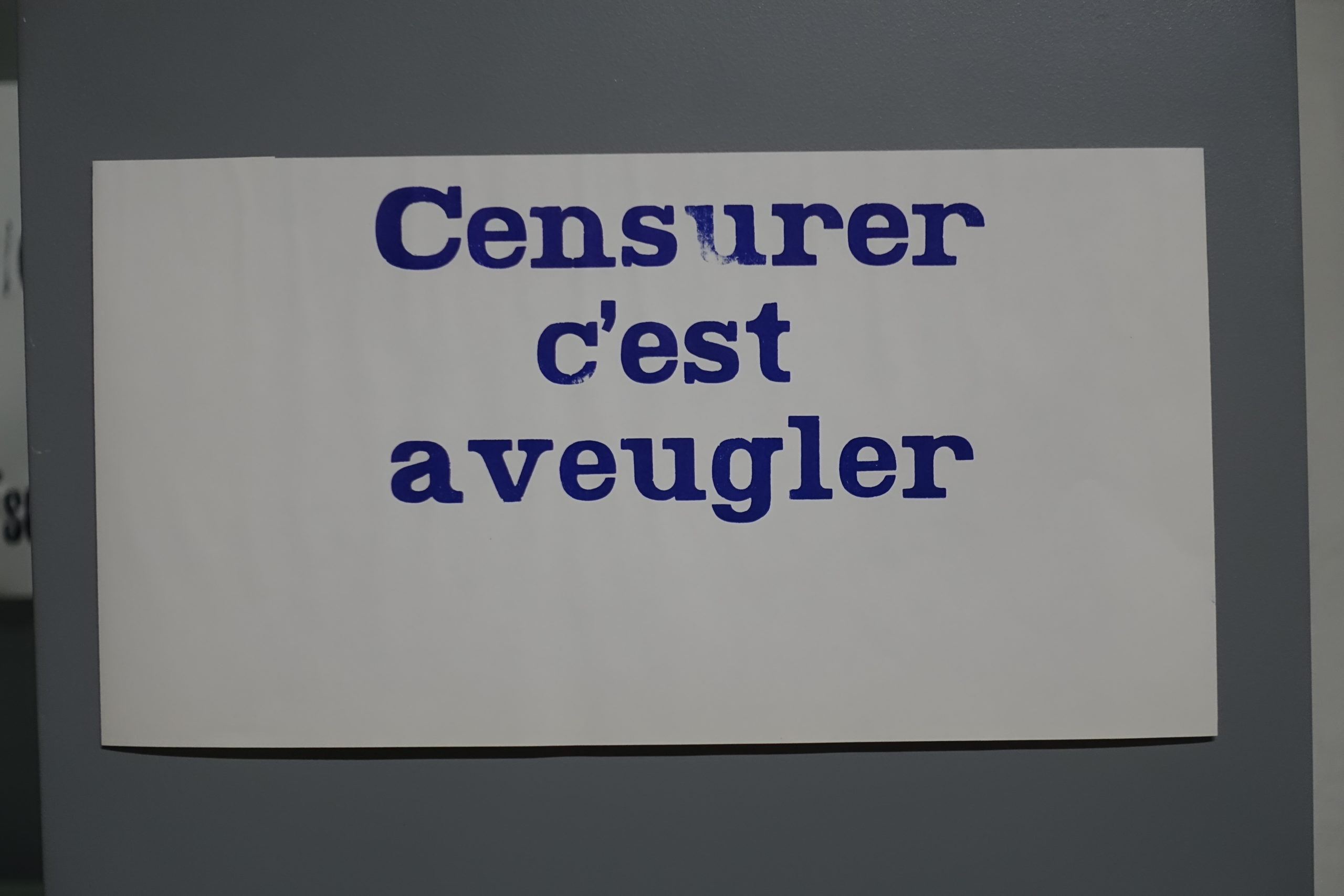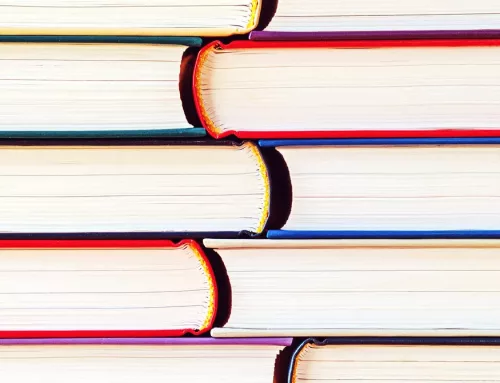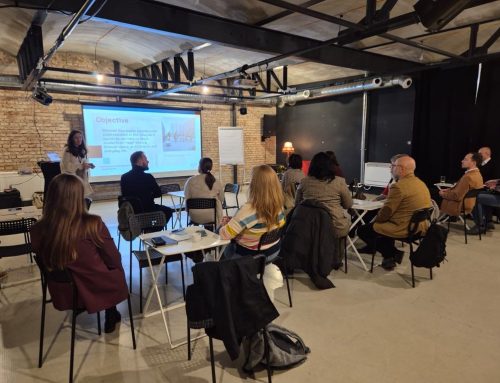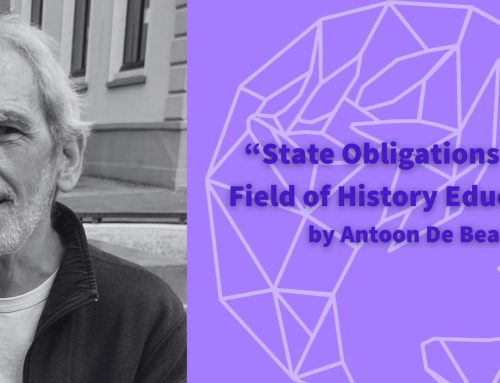In November 2019, an exhibition on the topic of censorship took place at the Association pour le Patrimoine Industriel (API) in Geneva, Switzerland. An ecomusée, the API is a special museum in charge of industrial heritage conservation. API seized the opportunity to link their exhibit on linotype and printing machine systems with issues related to press censorship – an especially timely showcasing given current sensitive discussions surrounding speech suppression (e.g., Julian Assange).
The director of the museum, Franck Vacheron, agreed to sit down with me to discuss the thought process behind the exhibit and answer some questions.
Caroline Morel: How do you link industrial heritage with citizenship?
Franck Vacheron: In the API, as a team, we have agreed to take a different approach when exhibiting old machines. Rather than presenting them in immaculate isolation, we link each machine to a thematic exhibition that deals with the rebirth of old techniques. In this way, we assist the visitor in contextualizing the machine in greater history and space. At the moment, our entire exhibition space, a former factory, is devoted to one object.
We work with a social commitment in mind. We frequently collaborate with older workers who have experience working with these forgotten machines and ask them to conduct workshops for younger generations. In the case of our current exhibition, we involved a local school class. They created anti-censorship slogans – considering the wording and layout before printing them using our machines. They did a great job composing and printing slogans that defend freedom of expression.
CM: Do you think you are writing tomorrow’s history?
FV: We work with unique and revitalized artifacts sans nostalgia. Our aim with this exhibit was to consider the dominant printing technology of today and re-purpose old machines to match contemporary
needs. Our vision is to bring the past to life by making its artifacts functional once again. It was initially difficult to rehabilitate these machines, but we persisted because we firmly believe they have utility and social value. In our own way, we contribute to a more circular economy and fight “planned” obsolescence. We are fighting against “autodafé” and amnesia, trying to save old works and machines from forgotten places rather than conceding to obsolescence and being complicit in waste creation.
It is no coincidence that our partner, a bookshop, is named “Fahrenheit 451” after the dystopian censorship story by Ray Bradbury. With every exhibition, we create a singular work of art to gather different individuals and encourage them to talk to one another. We see ourselves as a social laboratory in a sense. We are not looking at the past, rather we are creating a present that involves the intersection of old, forgotten technology and new. We are working for the common good.
CM: Can I ask you your opinion on contemporary press censorship? How does it differ from censorship of the past?
FV: Today’s suppression of speech more so takes the form of self-censorship. It is more insidious. We denounce collusion between the private (i.e., enterprises, corporations) and the public (i.e., the state). There is something reprehensible about this, most notably, when we see whistleblowers (e.g., lanceurs d’alerte, such as Assange and Snowden) under attack by states when they challenge established power structures and highlight security issues of great importance. In the face of this repression, society often remains indifferent. Our freedom is threatened.
CM: Why is it important for you to relay this fight against censorship and support of Julian Assange in Switzerland today?
FV: In Geneva, we have always had a tradition of welcoming refugees and the exiled – e.g., Voltaire, Mikhail Bakunin, Elisée Reclus, and Guiseppe Mazzini. This tradition applies today, even though censorship also exists here. The current Assange event is part of a traveling, global show going to Norway, London, Milan, and New York. We think our press exhibit is a bridge of sorts, as it deals with the clandestine press. We consider our association to be a kind of Noah’s Ark – should freedom of expression deteriorate, clandestine press facilitated by old press technologies will be necessary.
CM: Does your association belong to a larger network that organizes initiatives?
FV: Yes we are involved in the AEPM network, “courage foundation” (wsws.org and www.couragefound.org)
CM: As museum director, what is your opinion on the roles education, schools, and history teachers can play?
FV: We cannot function without the consultation of history educators who assist us in curating well-documented, serious exhibitions. Additionally, in Switzerland, we have a system of direct democracy, which allows any group of a thousand or more people to oppose a new law. Our museum promotes this system of civic engagement to young attendees of our workshops in an effort to educate them on what it means to be an active, responsible citizen. Our political system values group action. It is important for us to highlight that. In fact, we have received a special title from – “école et culture” (school and culture) – that certifies us as a reliable organization approved by the region to conduct these kinds of workshops.
CM: And, more generally, what kind of a role do you see an association like yours playing in history and citizenship education?
FV: Of course we have an invisible role, as do integration measures in general. We have 6 foreign students and protected persons on our team. They work on organizational culture, training, and generally help us expand our horizons and experiences by sharing theirs. We also host artists in residency. Everyone works in tandem to give a soul to the artifacts we present.
CM: Thank you very much for taking the time to speak with me today.
Caroline Morel is a EuroClio ambassador and history and geography teacher from France currently based in Geneva, Switzerland. She conducted this interview for EuroClio in November of 2019 at the API, a museum committed to active and introspective citizenship.













